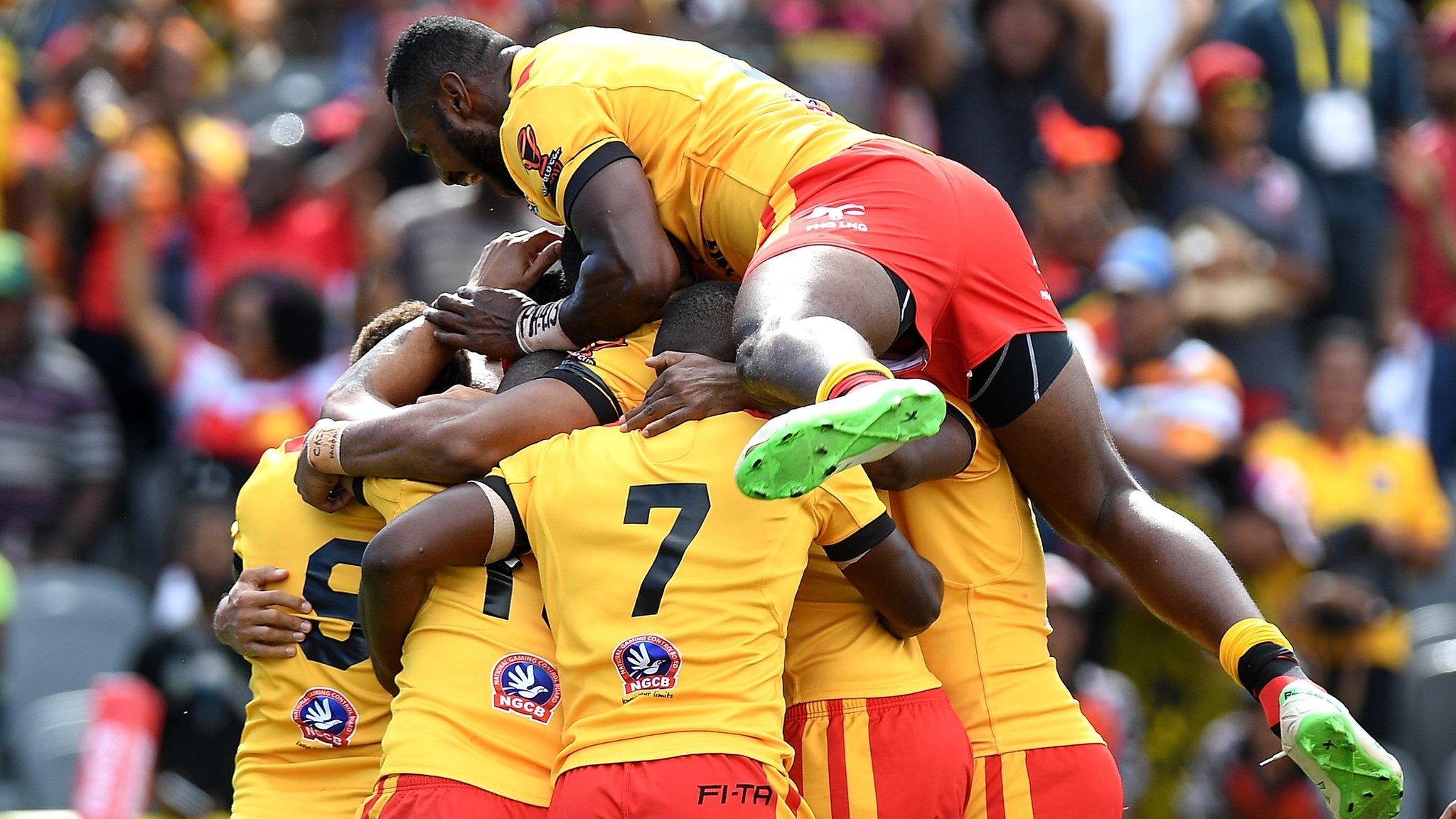Rugby League World Cup: The highs and lows of Wales' tournament history
- Published
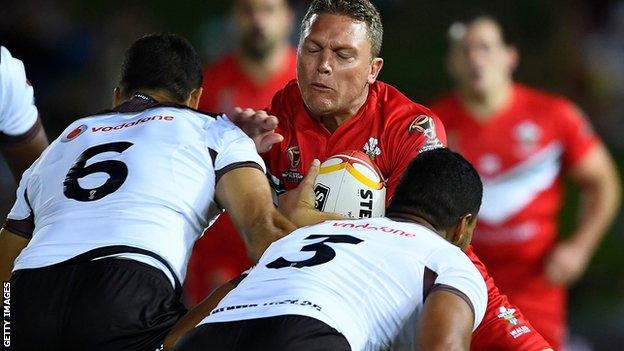
Wales' Christiaan Roets runs into strong Fijian defence in Townsville during the 2017 World Cup
Wales at Rugby League World Cup 2021 |
|---|
Cook Islands v Wales: Wed, 19 Oct; 19:30 BST at Leigh Sports Village, Leigh |
Tonga v Wales: Mon, 24 Oct; 19:30 BST at Totally Wicked Stadium, St Helens |
Papua New Guinea v Wales: Mon, 31 Oct; 19:30 GMT at Eco-Power Stadium, Doncaster |
Coverage: Watch live on BBC TV, BBC iPlayer and online; Live commentary on Radio 5 Live and Sports Extra; Live texts and highlights on BBC Sport website & app. |
Head coach John Kear takes his Wales squad into a second successive World Cup aiming to buck the odds in Group D.
Injuries, suspensions and switches of allegiance have trimmed Kear's playing choices - with just two full-time professionals in the 24-man squad - but a core of experienced campaigners remain to blend with emerging talents.
The odds of even making the knock-out stage are long indeed, with Wales not having won a World Cup game since 2000. In that sense at least, the pressure is largely off the Dragons.
Cook Islands - who Wales open their campaign against in Leigh on Wednesday night - would on paper seem the likeliest group opponents to claim a precious win against before greater tests against Tonga and then Papua New Guinea.
In the 2017 World Cup, Tonga reached the semi-finals and since then the Mate Ma'a Tonga, bolstered by players returning to their heritage rather than the ranks of New Zealand or Australia, have beaten both the Kangaroos and Great Britain, confirming them as genuine title contenders for this tournament.
Kristian Woolf, fresh from leading St Helens to a fourth straight Super League title, is in charge of Tonga's bid and awaits Wales in their second game at the Totally Wicked Stadium on his St Helens turf.
Wicked indeed, and Papua New Guinea will also be a formidable test with the raft of NRL and Super League talent at their disposal.
While the current Wales squad waits for their chance to become part of Wales' World Cup story, BBC Sport Wales looks back at the highs and lows of previous tournaments.
1975
Wales began life as an international side in 1908 and announced themselves with a 9-8 win over New Zealand's famous 'All Golds' touring side in their first official Test.
But despite producing players of the calibre of wing Billy Boston - Wigan's all-time record try scorer - Salford and Workington Town centre Gus Risman,, external Great Britain's 1972 World Cup-winning captain Clive Sullivan, and goal-kicking full-back Jim Sullivan, external - another Wigan legend - Wales did not play in a World Cup until 1975.
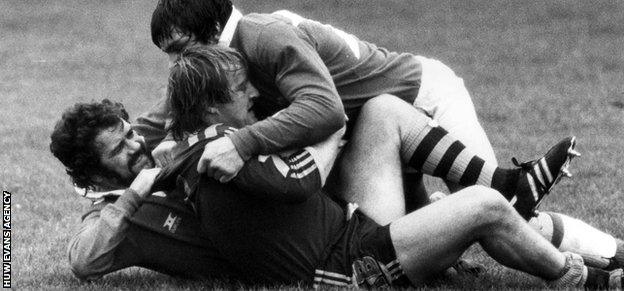
Dai Watkins (L) represented Wales in both codes and was a key player in the 1975 rugby league side
Even then, the 1975 tournament was billed not as a World Cup but as the 'World Championship Series' and saw Wales, France, England, Australia and New Zealand compete in a home-and-away league over nine months.
Wales began with defeat by France in Toulouse, but rebounded to beat England 12-7 in a match played at Lang Park in Brisbane, with Dai Watkins, Clive Sullivan and David Treasure grabbing tries for Wales.
England got their revenge in the return at Warrington, while two losses to Australia and one by New Zealand saw Wales languishing at the foot of the table.
But in their final two games of the campaign, Wales beat New Zealand 25-24 in a thriller in Swansea - despite having prop Jim Mills sent off - then overwhelmed France 23-2 in Salford to finish joint-third in the table with the Kiwis.
Mills, who also played six Tests for Great Britain, got his marching orders for stamping on the head of John Greengrass as the Kiwi prop went over for a try.
Greengrass needed 15 stitches in hospital while Mills, who played for Widnes and later became chairman of the club, earned notoriety for a moment of thuggery that saw him suspended for six months by the Rugby Football League and given a lifetime ban in New Zealand.
Wales beat Western Samoa in an entertaining match at The Vetch in Swansea
1995
Wales did not feature at a World Cup again until 1995, as a Great Britain team had been reintroduced in 1977.
But the Dragons announced their return with a bang, having already served notice of their talent by winning the European Championships that year.
Much of the cream of amateur Welsh rugby union had been enticed north to the 13-man code in the preceding years.
That meant Wales were able to field players of the calibre of Jonathan Davies, John Devereux, Allan Bateman, Scott Gibbs, Adrian Hadley, Scott Quinnell and Dai Young, alongside those such as Iestyn Harris, Anthony Sullivan and Keiron Cunningham who had grown up within rugby league.
They comfortably topped Group 3 with a 28-6 win over France in Cardiff and a hard-fought 22-10 victory against Western Samoa in Swansea.
That set up a semi-final against England, who Wales had humbled in the European Championships that year - seeing off their rivals 18-16 at Ninian Park in Cardiff.
Wales Rugby League: Behind the scenes before the 2017 World Cup
However, in front of 30,000 fans at Old Trafford, England gained their revenge with a 25-10 win.
Wales were holding their hosts 2-2 with a quarter of the match gone before a flowing length-of-the-pitch England move, started by wing Jason Robinson, ended with Paul Newlove forcing his way over in the corner.
On the stroke of half-time England captain Denis Betts went over to increase their lead to 11-4, before Phil Clarke and Martin Offiah, twice from cross-kicks, added further tries in the second half.
Wales had just Rowland Phillips' try to show in that second period, but it was a beauty of quick thinking and quick feet.
The replacement second row was brought down eight yards short of the line by Newlove, but spotting he had no marker at the play-the-ball the Warrington player tapped to himself and charged over.
Australia beat New Zealand in the other semi-final and the Kangaroos went on to edge England 16-8 in the final at Wembley.
2000
With Australia continuing to dominate rugby league, there had been a move to reintroduce a Great Britain side for the 1998 World Cup - a proposal that predictably angered the Welsh - but in the end the tournament was cancelled because of the Super League power struggle.
Peace was eventually restored and the next World Cup was held in 2000, although the Wales side had a much-changed character about it.
With rugby union having gone fully professional in 1995, the steady flow of players north from south Wales' 15-a-side heartland had largely dried up.
That saw a greater percentage of the squad drawn from rugby league's traditional territory, while the management's search for players with Welsh heritage unearthed a few gems such as Canberra Raiders prop Justin Morgan.
But while there had been a certain amount of rebuilding undertaken, Wales were still able to field the talents of Harris, Sullivan, Cunningham, Lee Briers, Anthony Farrell and Neil Cowie.
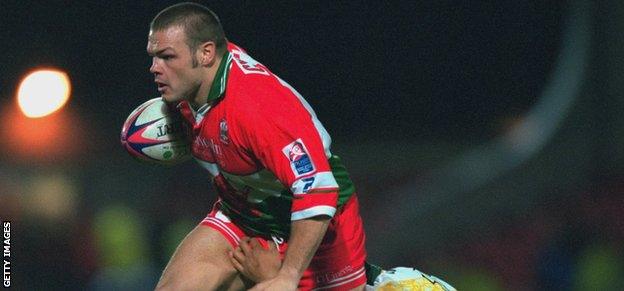
Hooker Keiron Cunningham was one of the mainstays of Wales' 2000 World Cup squad
Wales were drawn in Group 2 alongside New Zealand, Lebanon and the Cook Islands - their first opponents, whom they disposed of 38-6, external with ex-North Queensland centre Kris Tassell scoring a hat-trick.
Next up were Lebanon. While not a nation usually associated with rugby league excellence, the sizable number of second and third generation Lebanese in Australia meant Wales' opponents were actually packed with NRL experience.
Wales led 18-6 at half-time in Llanelli and when skipper Harris sent Wes Davies over for a 24-10 lead, the game looked safe for the home side.
But Lebanon staged a thrilling fightback as Hassan Saleh went over for two converted tries in the final three minutes, leaving Wales clinging on for a precious 24-22 win., external
That result secured Wales' place in the quarter-finals before they faced New Zealand in their final pool match, which the Henry Paul-inspired Kiwis won at a canter - scoring 11 tries in a 58-18 win, external at the Millennium Stadium.
Kept away from any of the big guns in the quarter-finals, Wales were comfortable 22-8 winners, external over Papua New Guinea in their first knock-out match before facing favourites Australia in the semi-finals in Huddersfield.
Wales give world champions Australia a scare in the 2000 semi-finals
When Brett Kimmorley and Wendell Sailor crossed early for the Kangaroos it seemed as though everything was going to script, but Wales produced a thrilling reply with three tries in eight minutes.
Ian Watson started the fightback, finishing off Farrell's break, before Tassell and Briers - brilliantly fielding Harris' high ball - touched down.
Harris converted all three tries, and with Briers adding two drop-goals Wales led 20-8 and were sniffing one of the biggest upsets in World Cup history.
But Australia reduced the deficit to 20-14 before half-time as Brad Fittler crossed for a converted try, then snuffed out Welsh hopes with a scintillating display in the final 25 minutes of the game.
Bryan Fletcher, Darren Lockyer twice, Fittler, Craig Gower and Ben Kennedy all crossed to earn the Kangaroos a 46-22 win, external and send them into the final, where they crushed New Zealand 40-12.
There was no World Cup in 2004 and Wales failed to qualify for the 2008 World Cup in New Zealand.
2013
Under the guidance of 1995 playmaker Harris, who had taken over as head coach in 2009, Wales entered the 2013 Rugby League World Cup as outside hopes.
Wales had claimed the 2010 European Nations Cup to qualify for the following year's Four Nations against New Zealand, England and Australia.
Although Harris' side lost all three of those encounters, Wales had gained valuable experience of mixing it with the perennial powers of international rugby league.
And in a World Cup being hosted jointly in England, Wales, France and Ireland, the Dragons - with a squad including 14 players from Super League clubs - harboured ambitions of reaching at least the quarter-finals.
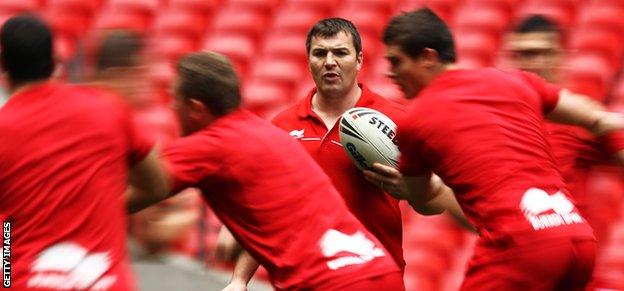
Coach Iestyn Harris had high hopes for his Wales side in the 2013 World Cup
In their World Cup group fixtures Wales faced Italy, United States and the Cook Islands.
Italy's squad was full of NRL experience, with the Azzurri able to call on a strong core of Australians boasting Italian heritage including Anthony Minichiello and Aiden Guerra.
They had served notice of their threat by handing England a surprise defeat in a warm-up game a week before the tournament began.
In their opener at the Millennium Stadium in Cardiff, Italy started strongly against Wales, but tries from Rhodri Lloyd and Ben Evans ensured Wales trailed just 14-12 at half-time.
Elliot Kear struck soon after the restart to put Wales into the lead for the first time and for a while it seemed as though Harris' men might hold out for victory.
But as the Welsh defence tired, James Tedesco, Chris Centrone and Mark Minichiello ran in late tries as Italy won 32-16 to dash home hopes.
After that set-back Wales were expected to beat World Cup debutants USA in their next match in Wrexham.
When Christiaan Roets scored the opening try everything seemed to be going to plan, but from then on it was all USA, as Clint Newton twice, Matthew Petersen, Joseph Paulo and Tuisegasega Samoa all crossed for the Tomahawks.
Wales rallied with a second Roets try and Anthony Walker's score but it was too little to avert a 16-24 loss, a result which ended their tournament hopes.
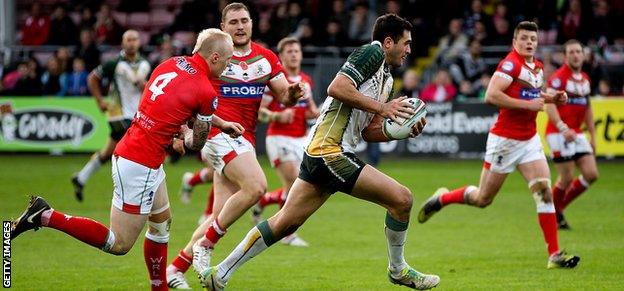
Jonathon Ford's late try for the Cook Islands ensured Wales would leave the 2013 World Cup without a win
Final opponents the Cook Islands had also lost to USA and Wales were expected to at least salvage some pride against a side that had lost all five of their previous games at World Cups.
But Wales got off to another slow start at the Gnoll in Neath, squandering possession to allow the Cook Islands to build a 12-point lead at half-time as Daniel Fepuleai, Keith Lulia and Isaac John went over.
Wales had just a Rob Massam try to show for their first-half efforts and when Dominique Peyroux crossed early in the second half to make it 22-4 things looked bleak.
The home side responded with a thrilling four-try burst as Lloyd White, Christiaan Roets twice and Rhodri Lloyd pulled the hosts to within two points.
But with eight minutes left Johnathon Ford sealed a 28-24 win with a fifth try for the Cook Islands.
Australia would win a one-sided final 34-2 at Old Trafford, trouncing a New Zealand side that had edged past England 20-18 in the semi-finals.
Harris stepped down as Wales coach the following year, saying he had "taken Wales as far as I could", and would take charge of Salford City Reds after that.
Current boss John Kear, who has coached both England and France, took the Wales reins in July 2014 and led the side into the 2017 World Cup.
2017
Wales faced a tough opener in the 2017 World Cup against a Papua New Guinea on home turf in Port Moresby.
David Mead scored a hat-trick as the rampant hosts ran in 10 tries in a 50-6 Pool C win, with wing Regan Grace claiming Wales' only try with the last play of the game.
Worse was to come in Wales' second game, a cross-pool match against Fiji that ended in a hurtful 72-6 defeat in Townsville.
The Pacific Islanders inflicted a record tournament defeat on Wales, scoring eight tries before half-time and adding another six after the break.
Wales' only score came in the 10th minute, when St Helens forward Morgan Knowles crossed on his 21st birthday.
Kear's team faced Ireland in their final match of the tournament with a chance to save face after two heavy defeats.
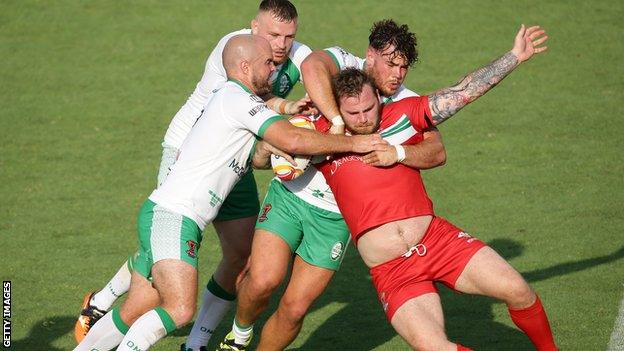
Wales' Ben Evans is stopped by the Ireland defence
Papua New Guinea's earlier 64-0 win over USA meant a quarter-final spot was out of reach of Ireland, who took out their frustrations on Wales with a 34-6 win.
The Irish ran in six tries and again Wales had to settle for a solitary consolation score, this time courtesy of Ben Morris' try just after half-time.
Australia would go on to claim the World Cup title in one of the tightest of finals, edging England 6-0 on home territory in Brisbane thanks to Boyd Cordner's try.
*A previous version of this article appeared in 2017
Related topics
- Published28 October 2017
